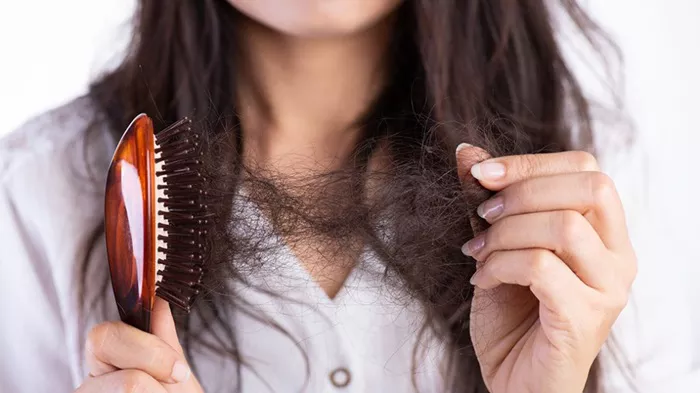Hair loss can be a distressing experience, impacting both your appearance and self-esteem. While it’s normal to lose some hair daily, excessive hair loss can be a sign of an underlying issue. Understanding what it means when your hair falls out a lot is crucial for identifying the cause and finding the appropriate treatment.
Normal Hair Loss vs. Excessive Hair Loss
Hair Growth Cycle
Hair grows in cycles: anagen (growth phase), catagen (transitional phase), and telogen (resting phase).
On average, you lose 50-100 hairs daily as part of the natural cycle.
Signs of Excessive Hair Loss
Finding large clumps of hair in your brush, shower, or pillow.
Noticeable thinning of hair or bald spots.
Significant shedding when washing or styling your hair.
See also: Does HRT Stop Male Pattern Baldness?
Causes of Excessive Hair Loss
Genetic Factors
Androgenetic Alopecia: Also known as male or female pattern baldness, this genetic condition affects both men and women.
Hereditary Hair Loss: If your family has a history of hair loss, you might be more prone to it.
Hormonal Changes
Pregnancy and Childbirth: Hormonal fluctuations during and after pregnancy can cause temporary hair loss.
Menopause: Decreased estrogen levels can lead to thinning hair.
Thyroid Problems: Both hyperthyroidism and hypothyroidism can cause hair to fall out excessively.
Medical Conditions
Alopecia Areata: An autoimmune disorder that causes hair to fall out in small patches.
Scalp Infections: Fungal infections like ringworm can lead to hair loss.
Chronic Illnesses: Diseases like diabetes and lupus can cause hair thinning or loss.
Medications and Treatments
Chemotherapy: Cancer treatments often result in significant hair loss.
Medications: Drugs for conditions such as high blood pressure, arthritis, depression, and heart problems can cause hair shedding.
Radiation Therapy: Treatment for head and neck cancers can lead to hair loss in those areas.
Nutritional Deficiencies
Iron Deficiency: Lack of iron can lead to anemia, causing hair to fall out.
Protein Deficiency: Hair is made of protein, so insufficient protein intake can result in hair loss.
Vitamin Deficiencies: Lack of vitamins such as Vitamin D, Vitamin E, and B vitamins can affect hair health.
Stress and Emotional Factors
Physical Stress: Surgery, illness, or significant weight loss can trigger hair loss.
Emotional Stress: High levels of stress and anxiety can lead to temporary hair shedding.
Diagnosing Hair Loss
Consult a Dermatologist
Seek professional advice if you notice excessive hair loss.
A dermatologist will perform a physical exam and review your medical history.
Scalp Examination
The doctor will examine your scalp for signs of infection, inflammation, or abnormalities.
Blood Tests
Blood tests can identify underlying health issues such as thyroid problems or nutritional deficiencies.
Pull Test
A simple test where the doctor gently pulls on a small section of hair to see how many hairs come out.
Scalp Biopsy
In some cases, a small piece of scalp tissue is removed and examined under a microscope.
Treatment Options for Excessive Hair Loss
Medications
Minoxidil (Rogaine): Over-the-counter topical treatment that stimulates hair growth.
Finasteride (Propecia): Prescription medication for men to slow hair loss and promote growth.
Corticosteroids: Used for conditions like alopecia areata to reduce inflammation and hair loss.
Lifestyle Changes
Balanced Diet: Ensure you get enough vitamins, minerals, and protein.
Stress Management: Practice relaxation techniques like yoga, meditation, or deep breathing exercises.
Proper Hair Care: Use gentle hair care products, avoid excessive heat styling, and be gentle when brushing or washing your hair.
Medical Procedures
Hair Transplant Surgery: Involves moving hair follicles from one part of the body to the thinning areas.
Platelet-Rich Plasma (PRP) Therapy: Involves injecting your own blood plasma into the scalp to stimulate hair growth.
Preventive Measures
Healthy Diet
Eat a balanced diet rich in fruits, vegetables, lean proteins, and whole grains.
Include foods high in vitamins and minerals such as iron, zinc, and biotin.
Regular Exercise
Exercise improves blood circulation, which can promote healthy hair growth.
Reduce stress levels through physical activity.
Avoid Harsh Treatments
Limit the use of harsh chemicals, dyes, and heat styling tools.
Opt for gentle shampoos and conditioners.
Protect Your Hair
Protect your hair from sun damage by wearing hats or using UV-protective hair products.
Avoid tight hairstyles that can pull on your hair and cause breakage.
Emotional Impact of Hair Loss
Psychological Effects
Hair loss can lead to low self-esteem, anxiety, and depression.
It’s important to address the emotional aspects and seek support.
Support Groups and Counseling
Join support groups where you can share experiences and coping strategies.
Consider counseling or therapy to deal with the emotional impact of hair loss.
Conclusion
Understanding what it means when your hair falls out a lot is the first step toward finding a solution. Whether the cause is genetic, hormonal, medical, or lifestyle-related, there are treatments and preventive measures available. Consult a healthcare professional for an accurate diagnosis and personalized treatment plan. Remember, managing stress, maintaining a healthy diet, and practicing good hair care habits can go a long way in preventing excessive hair loss.
You May Be Interested In

